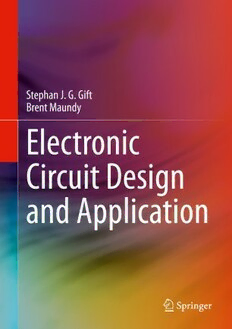Table Of ContentStephan J. G. Gift
Brent Maundy
Electronic
Circuit Design
and Application
Electronic Circuit Design and Application
(cid:129)
Stephan J. G. Gift Brent Maundy
Electronic Circuit Design
and Application
StephanJ.G.Gift BrentMaundy
ElectricalandComputerEngineering ElectricalandComputerEngineering
TheUniversityoftheWestIndies, UniversityofCalgary
St.AugustineCampus Calgary,AB,Canada
St.Augustine,TrinidadandTobago
ISBN978-3-030-46988-7 ISBN978-3-030-46989-4 (eBook)
https://doi.org/10.1007/978-3-030-46989-4
#SpringerNatureSwitzerlandAG2021
AllrightsarereservedbythePublisher,whetherthewholeorpartofthematerialisconcerned,
specifically the rights of translation, reprinting, reuse of illustrations, recitation, broadcasting,
reproductiononmicrofilmsorinanyotherphysicalway,andtransmissionorinformationstorage
andretrieval,electronicadaptation,computersoftware,orbysimilarordissimilarmethodology
nowknownorhereafterdeveloped.
Theuseofgeneraldescriptivenames,registerednames,trademarks,servicemarks,etc.inthis
publication does not imply, even in the absence of a specific statement, that such names are
exemptfromtherelevantprotectivelawsandregulationsandthereforefreeforgeneraluse.
Thepublisher,theauthors,andtheeditorsaresafetoassumethattheadviceandinformationin
thisbookarebelievedtobetrueandaccurateatthedateofpublication.Neitherthepublishernor
the authors or the editors give a warranty, expressed or implied, with respect to the material
containedhereinorforanyerrorsoromissionsthatmayhavebeenmade.Thepublisherremains
neutralwithregardtojurisdictionalclaimsinpublishedmapsandinstitutionalaffiliations.
ThisSpringerimprintispublishedbytheregisteredcompanySpringerNatureSwitzerlandAG
Theregisteredcompanyaddressis:Gewerbestrasse11,6330Cham,Switzerland
S.J.G. Gift dedicates the book to his parents, his wife Sandra,
and two sons Allister and Christopher.
Preface
Electronics is one of the most exciting areas of technology today. The
semiconductor or microelectronics revolution that started with the invention
of the transistor in 1947 and followed later by the introduction of the
integrated circuit comprising many transistors on a single chip continues
unabated. This most remarkable technology has resulted in the introduction
ofthemicroprocessor,thepersonalcomputer,cellphone,andMP3playeras
wellastheGPS,smartphone,theInternet,andtheself-drivingcar.Newand
amazingelectronicsystemsandsub-systemsareintroducedannuallyandthe
consumerisexposedtoadazzlingarrayoftrulyamazinggadgetsanddevices.
Thiswonderfulinventivenesshasbeenfueledbyunprecedented levels of
transistor integration density with the number of transistors on a single chip
growing from a few thousand in the early 1970s to over 10 billion in 2020.
Moore’slaw,whichholdsthattransistorICdensitywilldoubleevery2years,
stillhasrelevancesome50yearsafteritwasfirstproposed.Thus,extremely
powerfulICsareavailablethatcarryoutavastrangeofimportantfunctions.
Theworldinwhichweliveisananalogonewithsignalsgenerallybeing
continuous over time. However, computers are digital devices that represent
informationindiscreteforms.Withtheextensiveuseofcomputersandother
digital systems, the need for analog systems that interface the analog world
and the digital computer has become increasingly important. A smart phone
forexamplehasmanyanalogsensorsthatinterfacewiththeadvancedproces-
sor within. The internet of things that enables the wide collection and
processingoflargeamountsofreal-timedatahasspawnedanarrayofsensors
andICs,manyofwhichmustbeinterconnectedusinganalogcircuits.Thereis
anincreasingdemandforanalogmodulesintheseandothersystemsthatcarry
out a multiplicity of functions. There is therefore a critical need for the
developmentofskillsinanalogelectroniccircuitdesignandapplication.
Text Philosophy
This book treats with the design and application of a broad range of analog
electronic circuits in a comprehensive and clear manner. The discussion of
design and application in the text, we believe, brings out the inherently
interesting nature of electronics. There are several books on the market that
vii
viii Preface
dealextensivelywithanalogelectroniccircuits,butmosttendtogivetheory,
explanations,andanalysisofcircuitbehaviorandgenerallydonotenablethe
readertodesigncompletereal-worldfunctioningcircuitsorsystems.Thistext
addressesthisshortcomingwhiletreatingcomprehensivelywiththesubject.It
first provides a foundation in the theory and operation of basic electronic
devices including the diode, the bipolar junction transistor, the field effect
transistor, and the operational amplifier. It then presents detailed instruction
on the design of working real-world electronic circuits of varying levels of
complexityincludingfeedbackamplifiers,poweramplifiers,regulatedpower
supplies,filters,oscillators,andwaveformgenerators.Uponcompletionofthe
book, the reader will understand the operation of and be able to confidently
designabroadrangeoffunctioninganalogelectroniccircuitsandsystems.
Withtheproliferationofelectronicsystemstoday, theneedfor electronic
design engineers is greater than before, and this book we believe fills an
importantnicheintheworldofanalogelectronics.Itisintendedprimarilyas
anundergraduatetextforUniversityandCollegestudentsenrolledinelectri-
cal, electronic, and computer engineering programs. It should also prove
useful for graduate students and practicing engineers who need to design
practicalsystemstomeetresearchorreal-worldneeds.
Text Features
Thisbookenablesthereadertoanalyzeavarietyofcircuits,todevelopadeep
understanding of their operation, and to design and optimize a range of
working circuits and systems. Many examples help the reader to quickly
become familiar with key design parameters and design methodology for
eachclassofcircuits.Eachchapterstartswithfundamentalideasanddevelops
themstep-by-stepintoabroadrangeofapplicationsofreal-worldcircuitsand
systems. Each chapter ends with several circuit applications with a full
discussion of design methods. Also, at the end of each chapter, there are
researchprojectsthatareintendedtostimulatetheinterestsofthereaderand
encouragevaryinglevelsofinvestigationandexperiment.
Theattractivefeaturesofthebookincludethefollowing:
(cid:129) It comprehensively presents the design of working real-world analog
electroniccircuitsforkeysystemsandsub-systems.
(cid:129) Thematerialisclearlywrittenandeasilyunderstood.
(cid:129) Manyworkedexamplesoffunctioningcircuitsarepresented.
(cid:129) Designapplicationsbeginfromtheveryfirstchapterandcontinuethrough-
outthetext.
(cid:129) Research projects to stimulate and encourage further investigation are
includedattheendofeachchapter.
(cid:129) Ideasforfurtherexplorationarealsoincludedwiththeseapplicationsand
researchprojects.
(cid:129) Somesimulationsareusedtodemonstratethefunctionalityofthedesigned
circuits
Preface ix
(cid:129) Uponcompletionofthetext,thereaderwillbeabletoconfidentlydesign
importantanalogelectroniccircuits.
Text Overview
Thebookcontains14chapterswithcontentasfollows:
1. SemiconductorDiode–Providesasoundintroductiontosemiconductor
diodesandtheiruseinseveralcircuits.Applicationsandresearchprojects
arepresented.
2. BipolarJunctionTransistor–Introducesthebinaryjunctiontransistor,its
theoryofoperation,anditsvariousconfigurations.Theuseofthedevice
in the design of single stage amplifier circuits is fully discussed.
Applicationsandresearchprojectsarepresented.
3. FieldEffectTransistor–Introducesthefieldeffecttransistor,itstheoryof
operation, and its various configurations. The use of the device in the
design of single stage amplifier circuits is thoroughly discussed.
Applicationsandresearchprojectsarepresented.
4. BJTandFETModels–Exploreselectricalcircuitmodelsforrepresenting
the BJT and FET in accurately analyzing the behavior of circuits
containing these devices. Applications and research projects are
presented.
5. Multiple-Transistor and Special Circuits – Presents a comprehensive
discussionofmultiple transistorcircuits including severalspecial circuit
configurations.Applicationsandresearchprojectsarepresented.
6. Frequency Response of Transistor Amplifiers – Discusses the frequency
behavior of single stage and multiple stage transistor circuits. Several
importantconfigurationsareanalyzed.Applicationsarepresented.
7. Feedback Amplifiers – Introduces the concept of negative feedback,
distortion, andfrequency performance in amplifier systems and presents
full discussion of its application in amplifier design. Applications and
researchprojectsarepresented.
8. OperationalAmplifiers–Presentstheoperationalamplifierinitsvarious
configurations and discusses numerous applications of this versatile cir-
cuitelement.Applicationsandresearchprojectsarepresented.
9. Power Amplifiers – Thoroughly explores power amplifiers and the vari-
ousclassesandconfigurationswithnumerousdesignexamplesfromlow
power to high power systems. Applications and research projects are
presented.
10. Power Supplies – Provides a comprehensive discussion of unregulated
and regulated power supplies, their operation and design using discrete
and integrated components. Applications and research projects are
presented.
11. Active Filters – Presents a full discussion on the theory and design of
low-pass,high-pass,band-pass,band-stop,andall-passfiltersusingoper-
ational amplifiers. The Bessel, Butterworth, and Chebyshev filter

